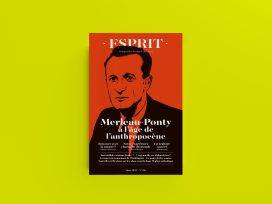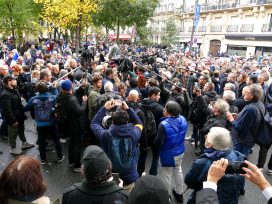Abstracts for Esprit 11/2006
Christian Jambet
The Regensburg misunderstandings: Islam, will, and intelligence
Benedict XVI’s quote from Ibn Hazm at Regensburg was not made at random. It refers back to a spate of twentieth-century French Christian scholars of Islam, including Louis Gardet, Henri Laoust, Roger Arnaldez, and, most of all, Louis Massignon, whose shared support of Muslim resistance to colonial rule drove them to bring Islam’s great mystics to the fore. First and foremost among these was Al-Hallaj, “Islam’s mystical martyr”, who was rather hostile to a Greek-style rationalization of the essence and attributes of divinity. Against this background, one would be wrong to think that the pope came in support of any bellicose stance or a confrontation between the “free world” and Islam.
Olivier Abel
Is the West split within Christianity?
The Regensburg speech is a strictly internal affair for the Western world: Benedict XVI expounded more on the Western world than on Islam, which in fact stood for the Reform. As he reaffirmed the continuum between the Greek logos and Roman Christianity, the pope criticized the Reform for having destroyed the analogy between God and reason, in the process endorsing a more radical type of transcendence as well as a more unpredictable divine will. Therefore, the pope’s main target was the Protestant faith, with the specter of sectarian utopias and the consumer individualism that go with it.
Hervé Legrand
The Muslim-Christian dialogue and EU enlargement to Turkey
Will the pope’s forthcoming visit to Turkey dispel the misunderstandings brought about by his Regensburg speech, and more specifically the suspicion that Roman Catholicism effectively stands as an explicit bulwark against Turkish EU membership? If we are to look beyond today’s divisive developments, we should take stock of the ongoing dialogue between Islam and Christianity and of the expectations that divine scholars have in store for us.
Thierry Naudin
Portobello Road: A London area in the “virtual” era
Walking down Portobello Road in northwest London, one can watch the changes an area has been going through over time, from the highly colourful locus of successive waves of immigration into a faux-Bohemian ghetto for those who got rich on the “new economy”. Virtual as the latter may be, it has been triggering a number of shifts that destroy the cultural strata that had built up in the area, along with the imaginary spheres that made its unique spirit.
Albert Levy
When urban planning faces up to the upheavals of post-industrial societies: The case of a project on the Paris left bank
A project being implemented along the left bank of the Seine in Paris epitomizes the three major upheavals that urban planning is currently going through. The discipline must evolve a project-oriented culture, taking into account many diverse stakeholders in any major endeavour while making the most of public consultations.
Joseph Bahout
Dubai and Beirut: The shadow and its duplicate
Since the 1980s and as part of a determined drive in favour of economic development, Dubai has taken inspiration from the way Beirut in the early 1970s managed to make the most of its geo-political position. However, as it looks to reap the full benefits of the local impact of globalization – and as demonstrated in the war this summer – Dubai’s drive has a feedback effect on Beirut’s own attempts to claim its place again in international business flows.
Michel Foucher
European political union: A territory, borders, and horizons.
Europe’s borders stand as a polemical as well as an insoluble issue. Still, can the topic of territorial foundations be kept out of Europe as a political project? Probably not, but then we should consider territory as a project more than a legacy. Based on this rationale, the author proposes four scenarios for 2015, first and foremost calling on Europe to stabilize its expansion while developing consistent policies towards its peripheral areas.
Zaki Laïdi
Should left-wing politics fear globalization?
What exactly lies behind French leftwing reluctance vis-à-vis globalization? On top of an opportunity to distinguish oneself from rightwing politics, one can also find a time-honoured doctrinal irresolution over capitalism as well as a more recent tendency to give in to an ambient pessimism that fails to identify any opportunities in the ongoing transformation.
Franck Baetens
That Zidane head-butt: A mythological reading
Far from being confined to physical performance and fine action, sport can also generate the sort of storytelling that will make sense for a much wider public. In this vein, Zidane’s last high-profile action before going into retirement can give rise to a story that brings together all the defining patterns of ancient mythology.
Published 21 November 2006
Original in French
Contributed by Esprit © Esprit
PDF/PRINTNewsletter
Subscribe to know what’s worth thinking about.



